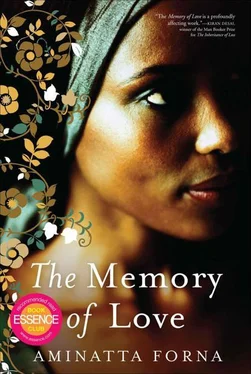How long he lies there, feeling the sun dry the salt on his face, the cradling motion of the waves, he does not know. By the time he walks back up the beach to retrieve his clothes, the barman is gone, his book has been placed on a shelf behind the counter. Kai reaches over and takes it, places a note on the bar where the book had been, and covers it with a glass. Eyes stinging, he pulls his clothes on over his wet skin and heads for the road. Back to the only real sanctuary he knows.
Eight o’clock. Kai had eaten his evening meal in the canteen, pretending to read papers as an excuse for sitting alone.
Now he carries the book about the Emperor Qin Shi Huang under his arm as he crosses the courtyard. A wind rustles around the hospital buildings and high in the trees. The coppery scent of rain is in the air. Too early yet for a moon, the night is in its darkest phase.
Inside the ward the smells are of iodine and dust. All is quiet. A nurse sits at her post bent over a book of puzzles, as though in prayer to the plaster statue of the Virgin on the desk before her. She smiles and would have risen, but he waves at her to stay seated. He walks down the ward, his progress marked by a head lifted here, a hand raised there, small stirrings, a breeze through a cornfield.
A ward light shines over Foday’s bed. Ordinarily he is awake at this hour, radio pressed close to his ear. Not so this evening. The radio sits on the windowsill, alongside Foday’s neatly stacked belongings. Foday is lying on his back, asleep. An arm has fallen free from the bedclothes. Kai places the book on the windowsill and goes to fold the stray arm away. Beneath his fingers Foday’s skin burns. Kai bends to look at Foday. He is shivering, his brow coated in sweat, his breaths shallow and noisy. Foday’s eyes are open, unblinking, gazing at Kai.
‘Jesus!’ Kai reaches for the bell cord. From her post across the room the nurse rises from her desk and comes, first walking, then running towards them. ‘Call the OR. Tell them to get ready. Get me a porter!’
She looks at him and blinks, momentarily frozen, snapped back into being by the sound of Kai’s voice. ‘Move!’
He waves a hand in front of Foday’s face and is pleased to see him respond. There is even the shadow of a smile. ‘What are you trying to do here, my friend?’ Kai says. ‘Undo all my good work?’
In the operating theatre Kai takes a circular saw and cuts through the cast on Foday’s leg, pulling apart the two sides with a sound like splitting wood. A fine layer of plaster of Paris dust coats the floor and his feet. Bending the overhead light down over the foot he checks carefully each of the surgical incisions. They appear to have healed well a month on from the operation. The cast has been changed once already. ‘Get me a torch,’ he tells the nurse. ‘And ask someone to find out if Seligmann is around.’
Kai moves the light of the torch inch by inch, over the sole of Foday’s foot, where the skin is dry and flaking from the weeks in plaster.
‘Hold his leg up for me, please.’
Now he inspects the long tendon scar. There. He missed it the first time. A sinus tract over the healing scar tissue. He takes a scalpel and makes a small incision close to the wound, presses with his fingertips. A thick stream of pus jets out. Seligmann enters through the double doors, gives a long, low whistle and a shake of the head.
‘This country of yours. Everything rots. You must make very good compost.’ He bends to gaze at Foday’s leg. ‘Explore. Debride. Remove any necrotic tissue.’ He blows out under his face mask. ‘Textbook stuff. Still, looks like this is going to set us back a bit.’
What time is it? Midnight? One o’clock. He doesn’t know and, now he thinks about it, doesn’t care. He is lying on his back, staring at the stars. Now, which is the Plough? He has never, for the life of him, been able to see why it should be so called. People in the past had tried to show him, to point out the shape, but he couldn’t see it. He couldn’t see it at all. He hiccups and then burps, wetly. He is drunk.
Nenebah. He would have liked to touch her. Just to hold her hand in his. To feel her skin. He used to like to grip her lightly with one hand at the side of her neck. She would tilt her head and trap his fingers.
How easily they spoke of love. And yet, when she’d needed the certainty of his feeling for her, he’d let her slip away, never able to bring himself to tell her about the ways in which he’d been changed. He’d been incapable, and in being incapable he’d let Nenebah believe the problem lay with her.
Something bumps the side of his head, a piece of wood, something covered in tar, a lump of old polystyrene. He sits up slightly and flounders in the water, is hit by a passing wavelet and momentarily submerged. He wipes his face and looks at the distant shore. There are still people at the beach bar to which he had returned late in the evening and where the barman had unctuously welcomed him. Spurred by a memory of the peace he had found in his mid-afternoon swim, Kai had taken to the water for the second time in a day. Drifting along like an abandoned boat, one whose occupants have drowned. A pitch black, perfect peace.
He lays his head back in the water and searches for the Plough. He ought to be getting home. He lifts his head again, tracks the cones of a car’s headlights down the long beach road.
Ah, he thinks, and lays his head back upon his pillow of water.
A silver sea, smooth and still, the reflection of a gull moves across the surface, a few clouds in the sky, elliptically shaped, like a school of porpoises. Here and there other gulls float undisturbed on the water. On the shoreline, a mother and her toddler. The child, wearing red wellington boots, is running through the surf away from his mother, looking over his shoulder at every turn to make sure she is following. Adrian can hear, dully through the glass, the sound of the mother’s voice. She is smiling and at the same time calling warnings. A perfect autumn day, thinks Adrian. Busy looking over his shoulder the child loses direction and veers into the sea; water splashes over the top of his boots. Now the mother is pulling them off and pouring the water out of each one. She is holding the child tight to her in one arm; his feet dangle several inches above the sand. But the child struggles to be free and so the mother sets him down. He runs away. The mother follows behind carrying the boots. The child runs away, away: shrieking, giddy with freedom. His blond hair blown about in a wind of his own making.
‘No biscuits. Sorry, darling. I should have got some in, but I only drive into town once in a while and I don’t eat them any more myself. When you called I’d no idea you’d be here quite so quickly.’
‘It’s fine,’ says Adrian. He turns away from the window and the boy, moves to take the tea tray from his mother and set it down upon the low table. He says, ‘You must spend a lot of time just looking at all of this.’
His mother nods. ‘It’s never the same from one hour to the next. It’s the sky, you know. People complain Norfolk is flat, but they’re looking in the wrong place. You need to lift your head. It’s the sky that matters. Of course, you know that. I forget sometimes.’
He’d arrived the evening before in a tepid light, feeling drained by the long drive from London. During supper, eaten on their knees opposite each other in the sitting room, he’d been more aware of the reflections on the glass, of his mother entering and leaving the room than of what lay beyond the darkness. The meal they ate was sparing, his mother’s once lush cooking sacrificed to the austerity of cholesterol and blood-sugar levels. They had not spoken of his reason for being there. Adrian had volunteered nothing and his mother had not asked, her forbearance itself a clue as to how serious she must imagine it to be. She had opened a bottle of rather good wine, a gesture he felt was replete with solace as much as celebration.
Читать дальше












